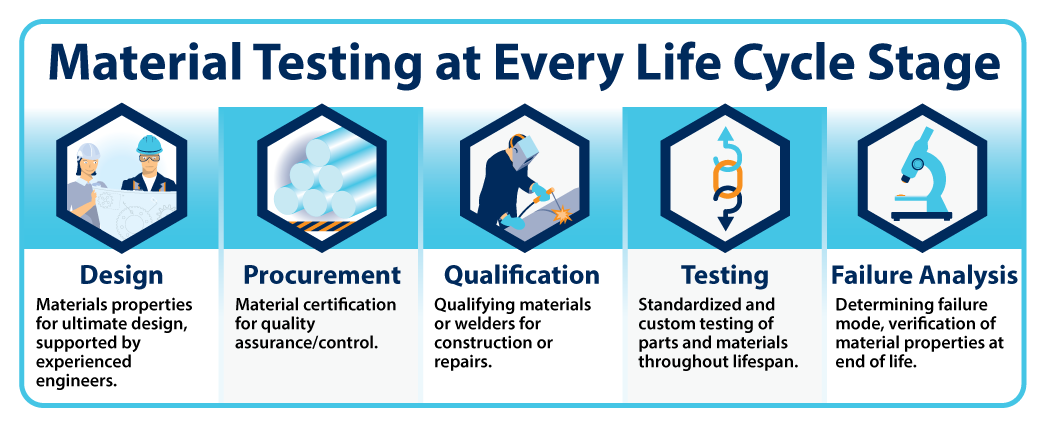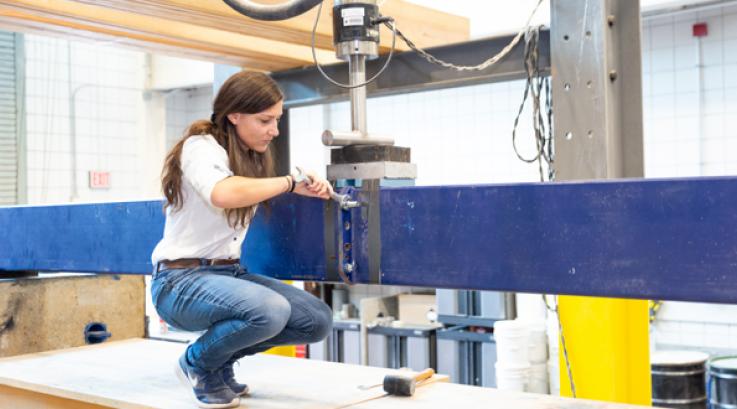Precision Perfected: Materials Test Lab Insights for Success
Wiki Article
Advancing Technology: The Crucial Function of Materials Screening in Numerous Industries
In order to make sure security, performance, and high quality, products screening plays a pivotal function in sectors such as aerospace, automotive, medical care, and building. In the aerospace industry, materials testing helps in the development of high-strength and lightweight materials that withstand severe problems. In medical care and building and construction, products evaluating ensures the use of trusted and safe products, improving both individual care and framework.Value of Materials Screening in Aerospace
Products testing plays an essential role in making certain the integrity and safety of aerospace components and frameworks through rigorous exam and evaluation. In the aerospace sector, where the risks are high and the consequences of failure can be disastrous, the need for detailed and precise testing is critical.Aerospace materials have to hold up against extreme problems such as high temperatures, stress differentials, and vibrations, while keeping their architectural stability. Products testing allows designers to review the efficiency and resilience of these materials under simulated operating problems. It assists identify prospective weaknesses, issues, and failing settings, permitting essential layout modifications and renovations.

In addition, products screening plays a crucial role in examining the suitability of brand-new products and manufacturing procedures for aerospace applications. With improvements in innovation and the introduction of unique products, such as superalloys and compounds, it is important to assess their efficiency and compatibility with existing systems. Evaluating gives beneficial data on product residential properties, behavior, and possible dangers, making it possible for notified decision-making in the design and option of products for aerospace applications.
Products Testing in the Automotive Industry
In the world of automotive manufacturing, materials screening plays an important function in ensuring optimum performance and safety of vehicle components and frameworks. The automobile sector demands materials that can hold up against extreme conditions such as high temperature levels, corrosive atmospheres, and intense resonances. Consequently, extensive screening is essential to review the mechanical buildings and durability of numerous materials utilized in automobile applications.Materials screening in the automotive industry incorporates a vast range of evaluations, including tensile toughness, firmness, influence resistance, tiredness life, and deterioration resistance. These tests assist producers pick one of the most ideal products for different components of the car, such as the engine, framework, body, and indoor elements.
One of the critical elements of products screening in the automobile sector is crashworthiness analysis. This includes subjecting automobile structures and security components to simulated accident circumstances to assess their ability to dissipate and absorb influence power, therefore protecting passengers during accidents. By performing such examinations, suppliers can maximize the layout and materials used to improve overall automobile safety and security.
Moreover, materials screening likewise plays a critical duty in progressing automotive technologies. With the boosting demand for electrical cars (EVs), materials screening aids ensure the efficiency and dependability of battery systems, electric elements, and light-weight materials utilized to optimize array and effectiveness.
Ensuring Safety and Top Quality in Health Care With Materials Testing
Making sure safety and quality in medical care depends heavily on extensive materials testing procedures. Using appropriate materials in clinical devices, tools, and pharmaceutical items is critical to avoid damage to patients and ensure the efficiency of treatments. Products testing plays an important role in the medical care market by reviewing the physical, chemical, and organic residential or commercial properties of materials made use of in clinical applications.One key element of products testing in medical care is the analysis of biocompatibility. Clinical devices and implants need to work with the human body to minimize the risk of damaging responses, such as infection, cells, or swelling being rejected. Evaluating approaches, such as cytotoxicity testing, sensitization screening, and implantation read more research studies, aid determine the biocompatibility of materials.
Another crucial location of products testing in medical care is the evaluation of pharmaceutical products. materials test lab. Evaluating makes certain that medications are risk-free, effective, and without pollutants. This includes assessing the stability and stability of medication formulas, assessing the release of active ingredients, and determining possible pollutants or deterioration items
In addition, products screening is necessary in verifying the efficiency and toughness of medical devices. Checking procedures assess the mechanical toughness, resistance to damage, and dependability of tools, such as syringes, catheters, and surgical tools. This ensures that medical care specialists can depend on these tools throughout vital treatments, reducing the danger of failure or malfunction.
Enhancing Longevity and Performance in Building With Products Screening
To guarantee enhanced durability and performance in building and construction, products testing plays a vital role by assessing the structural honesty and high quality of structure products. Construction tasks need products that can hold up against various environmental problems, lots, and tensions, and products testing helps in selecting the most appropriate products for the task.Products testing in building and construction involves subjecting structure products to a variety of tests to identify their performance, stamina, and resilience. These examinations consist of assessing the compressive strength of concrete, the tensile strength of steel reinforcements, the resistance to rust, and the thermal residential properties of insulation materials. By performing these tests, engineers and contractors can make sure that the materials utilized in building fulfill the required criteria and requirements.

One of the primary benefits of materials testing in building and construction is that it assists recognize any kind of prospective weak points or problems in the structure materials prior to they are made use of in the construction process. By identifying these problems early, essential modifications can be made to make sure the architectural honesty and longevity of the structure.
Additionally, materials screening additionally plays a vital function in high quality control during building and construction. By regularly checking the products throughout the building process, building contractors can confirm that the products being utilized fulfill the needed specifications and performance standards. This guarantees that the final structure will be risk-free, long lasting, and able to hold up against the desired lots and anxieties.
Pushing the Borders of Development: Materials Screening in Various Industries
By subjecting products to extensive screening, scientists and engineers gain useful insights into their residential or commercial properties and habits, enabling them to develop brand-new and improved products and processes. In the automobile industry, for example, products screening helps boost car security and performance by examining the toughness, resilience, and crashworthiness of various elements.In Get the facts the aerospace industry, products screening is essential for ensuring the reliability and efficiency of airplane frameworks and parts. Through considerable screening, engineers can identify materials that can endure the extreme conditions of flight and fulfill strict safety and security standards. This allows for the growth of lighter, much more fuel-efficient aircraft that can hold up against severe temperature levels, pressures, and vibrations.
In the medical field, materials screening is crucial for the advancement of cutting-edge clinical tools and implants. By evaluating the biocompatibility, strength, and durability of materials, scientists can make sure that these products are reliable and secure for use in the human body. This allows improvements in locations such as orthopedics, cardiology, and dental care, causing enhanced person outcomes and lifestyle.
In the power market, products testing plays an important role ahead of time sustainable power modern technologies. By subjecting materials to extreme problems, scientists can identify products with improved performance and resilience for use in solar panels, wind generators, and energy storage space systems. This drives development in the advancement of more lasting and reliable energy solutions.
Verdict
In verdict, materials testing explanation plays a crucial function in various industries consisting of aerospace, automobile, health care, and building. It makes certain safety and security, high quality, toughness, and efficiency of products made use of in these sectors.In the aerospace industry, materials testing assists in the advancement of high-strength and lightweight materials that withstand extreme problems. In medical care and construction, products examining makes sure the use of trusted and risk-free materials, improving both individual care and framework.Furthermore, products screening plays an important role in assessing the suitability of new materials and manufacturing procedures for aerospace applications. Examining provides valuable data on product buildings, habits, and possible risks, making it possible for notified decision-making in the style and choice of materials for aerospace applications.
By frequently examining the materials throughout the building and construction process, builders can verify that the products being made use of meet the required specs and performance standards.
Report this wiki page